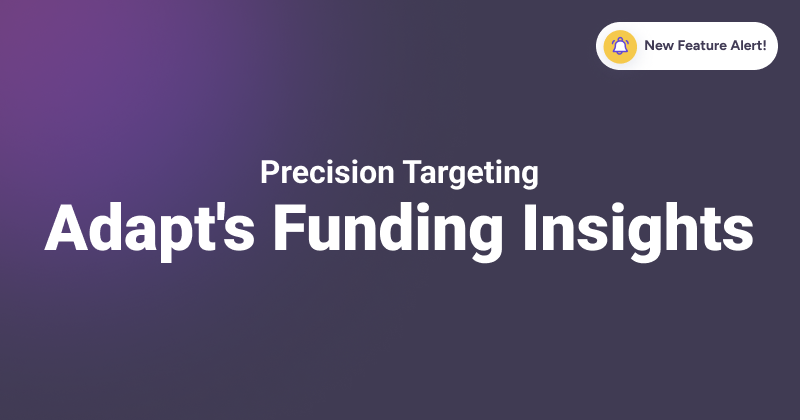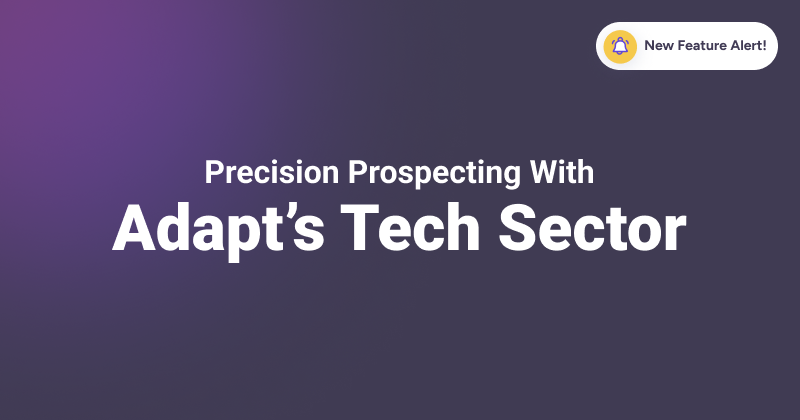As a salesperson, your primary goal is straightforward: sell products or services. It might seem simple enough—sell a bit here, a bit there, and hit those quarterly targets. However, the reality is far from simple, particularly when you lack detailed knowledge about your potential customers. Without access to the correct data on your prospects and the support of top-tier sales intelligence tools, making a sale can become quite a daunting challenge.
This is why sales prospecting software is crucial for sales reps and businesses today. These tools empower you to gather, analyze, and leverage essential information, informing you and your team about new leads and market insights.
For instance, sales intelligence platforms play a pivotal role in creating and prioritizing lists of leads for companies. Furthermore, many of these tools offer features that allow sales reps to monitor significant changes within target companies, alerting them to new opportunities and helping to boost B2B sales strategy.
In this blog, we will explore the 13 best sales intelligence tools that can significantly help your business grow. So, without any further ado, let’s dive in!
An Introduction to Sales Intelligence Tool
A sales intelligence tool is a sophisticated solution that empowers sales and marketing teams with valuable insights into their markets and prospective clients, aiming to boost revenue. It offers a deep dive into customer behaviors, industry dynamics, competitive landscapes, and potential areas for expansion, leveraging a blend of internal and external data sources for comprehensive, actionable intelligence.
Key features often include:
- Real-time analytics and predictive insights
- Automated lead scoring and customer segmentation
- Detailed account profiles and visualization tools
- AI-powered recommendations
- Collaboration features and automated marketing campaigns
- With sales intelligence, organizations gain a competitive edge, maximizing their sales efforts for tremendous success.
Benefits of Sales Intelligence Tools
In sales, knowledge is power. The correct information about your leads can mean the difference between winning a new customer and missing out.
This power is undeniable – 70% of salespeople and marketers find sales intelligence tools essential for successful prospecting.
Let’s explore the key benefits these tools offer:
Improved Sales Performance: Sales intelligence unlocks customer insights, empowering salespeople to personalize their approach for tremendous success and higher conversion rates.
More intelligent Lead Prioritization: Sales intelligence tools rank leads based on critical criteria, allowing teams to focus on the most promising prospects and boost conversion potential.
Accelerated Sales Cycles: Identify the best leads and gain timely insights into their needs, shortening the sales cycle and streamlining the path to closure.
Data-Driven Decisions: Sales intelligence replaces guesswork with accurate analytics. It empowers managers to make informed, data-backed decisions for strategic success.
Accurate Forecasting: Analyze historical trends and patterns for reliable sales forecasts. This allows for better resource planning, realistic goal-setting, and more innovative budgeting.
Competitive Advantage: Gain critical market insights to differentiate your offerings, highlight your strengths, and confidently position your products.
Top Sales Intelligence Tools in 2024
Adapt

Adapt.io stands out as a top-tier sales prospecting tool. It offers businesses access to an expansive and meticulously verified B2B contact database, facilitating the execution of effective sales campaigns. With over 200 million precise and authenticated contact profiles, targeting your ideal audience becomes easy.
Here’s why it’s a top choice:
Data Accuracy: Delivers reliable and verified B2B contact details, which is crucial for generating high-quality leads.
Vast Database: Access to a comprehensive database of over 200 million B2B contacts spanning various industries and geographical locations, enabling the creation of finely-tuned prospect lists.
Sophisticated Search and Filtering: Employs advanced search filters to help users effortlessly identify their target audience based on detailed criteria such as industry, revenue size, department, job role, technology used, and more.
Easy Integrations: It offers smooth integration capabilities with a wide range of marketing and sales platforms, simplifying the process of connecting with potential leads.
Dedicated Customer Support: Adapt.io is recognized for its exceptional customer service. It provides proactive support and guidance to its users, underscoring its commitment to user satisfaction.
Beyond Data, Adapt.io Offers:
- Lead Enrichment: Add 20+ data points to enhance your existing lead database.
- Contact APIs: Supercharge your prospecting and enrichment processes.
- Alerts: Stay updated on job changes within your prospect list to keep your data fresh.
Pricing: Available upon request.
Winmo
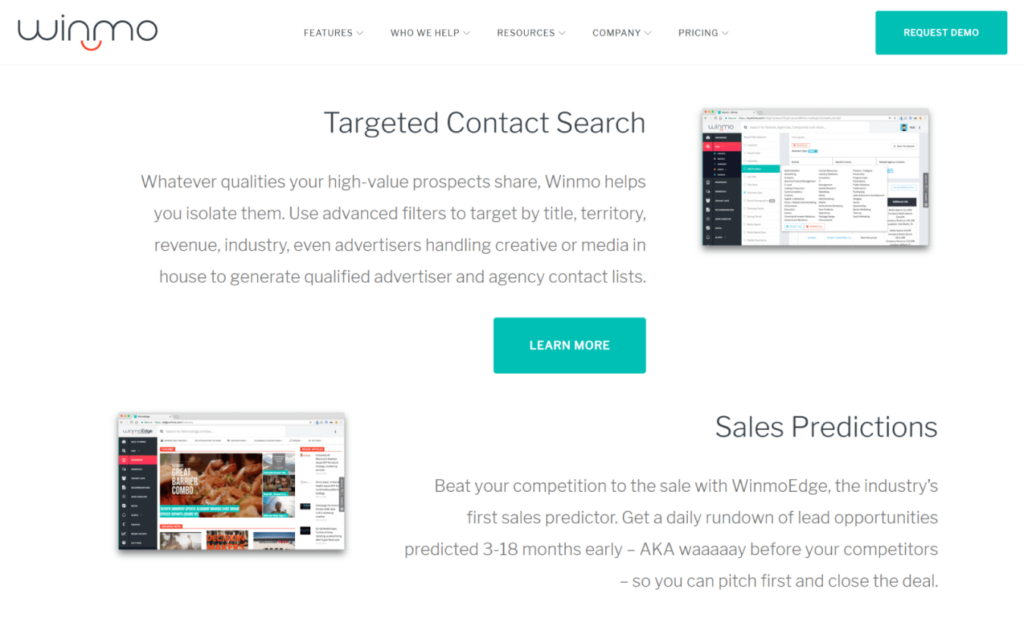
Winmo simplifies identifying the ideal contact for your sales efforts through its precise contact search feature. It distinguishes itself as a multifaceted sales intelligence tool, maintaining an up-to-date lead database curated manually by a dedicated research team without the reliance on automated bots.
WinmoEdge enhances this offering with predictive sales insights, alerting you to potential sales opportunities well in advance. It enables you to customize alerts and recommendations, ensuring you pay attention to valuable leads.
Winmo prefers direct inquiries for pricing information, as details are not listed publicly on its pricing webpage.
Lusha
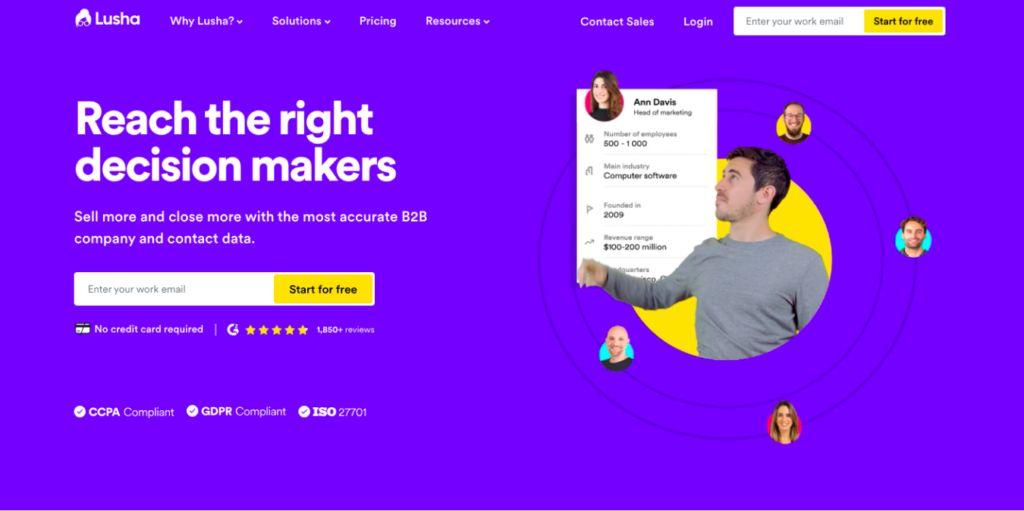
Lusha stands out as a B2B sales prospecting solution, enabling companies to discover and engage with prospective clients. It grants access to an expansive database of profiles, including direct contact details and essential company information. By streamlining the prospecting process and accelerating outreach efforts, Lusha empowers businesses to create engaging lists of potential clients, increasing the conversion rate from prospects to customers.
Pricing – Subscription plans begin at $39.00 per month.
FindThatLead
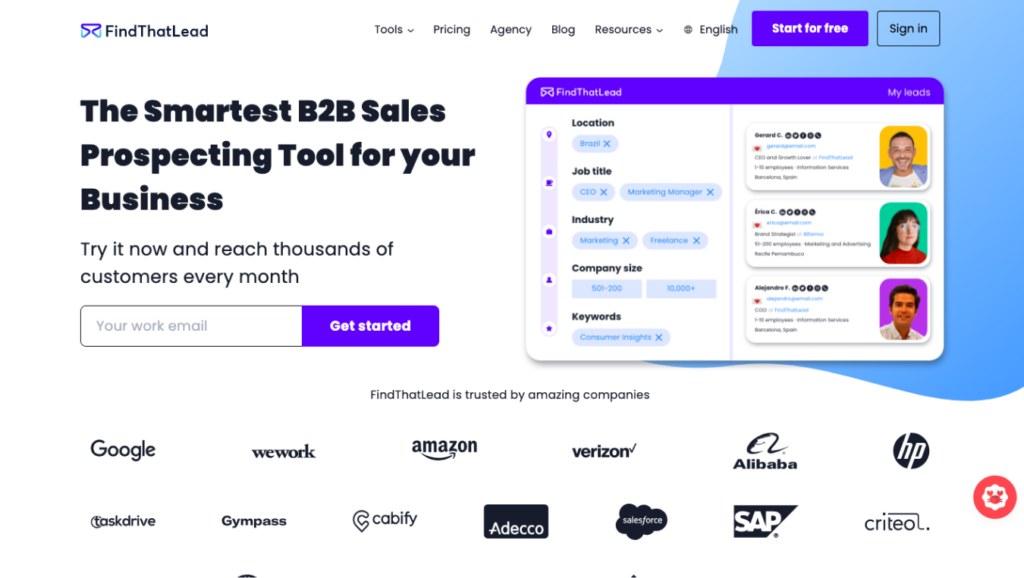
FindThatLead empowers businesses to discover and connect with qualified prospects. Get accurate email addresses, phone numbers, and a powerful Chrome extension for seamless LinkedIn lead generation.
Key Benefits:
- Massive Contact Database: Tap over 500 million contacts to fuel your sales pipeline.
- Verified Data: Boost deliverability and save time with verified contact information.
- Prospecting Power: Find leads by domain and seamlessly integrate with your favorite CRM and marketing tools.
Pricing starts at $29 per month.
Hunter.io
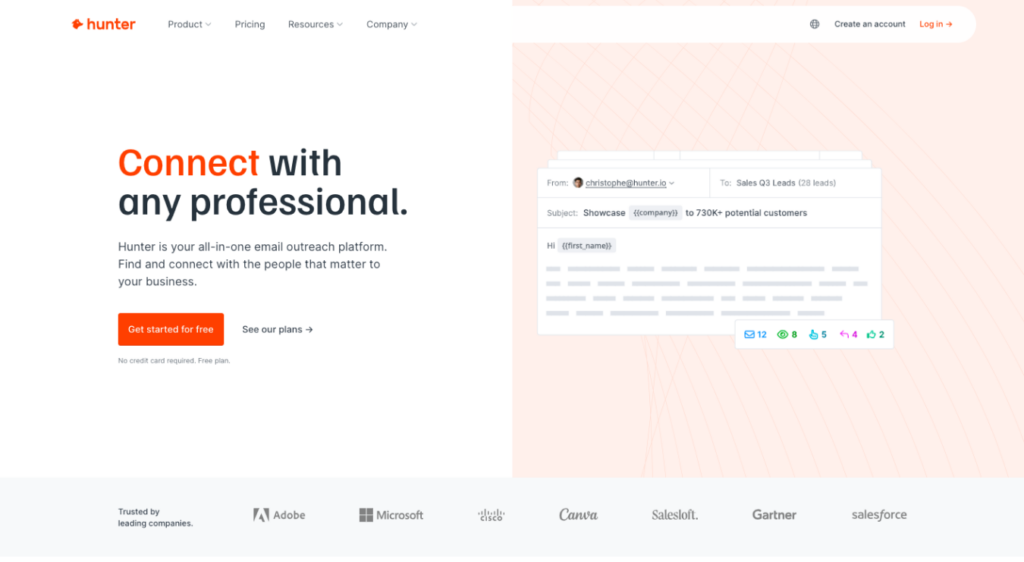
Hunter.io simplifies sales prospecting by uncovering verified email addresses associated with any domain. Streamline your outreach, target the right contacts, and boost your conversion rates.
Key Features:
- Email Finder: Instantly locate the email addresses you need.
- Real-time Email Verification: Ensure your personalized emails reach the right inbox and avoid bounces.
Hunter.io offers a free plan (25 lookups/month) and paid plans starting at €49/month.
Datanyze
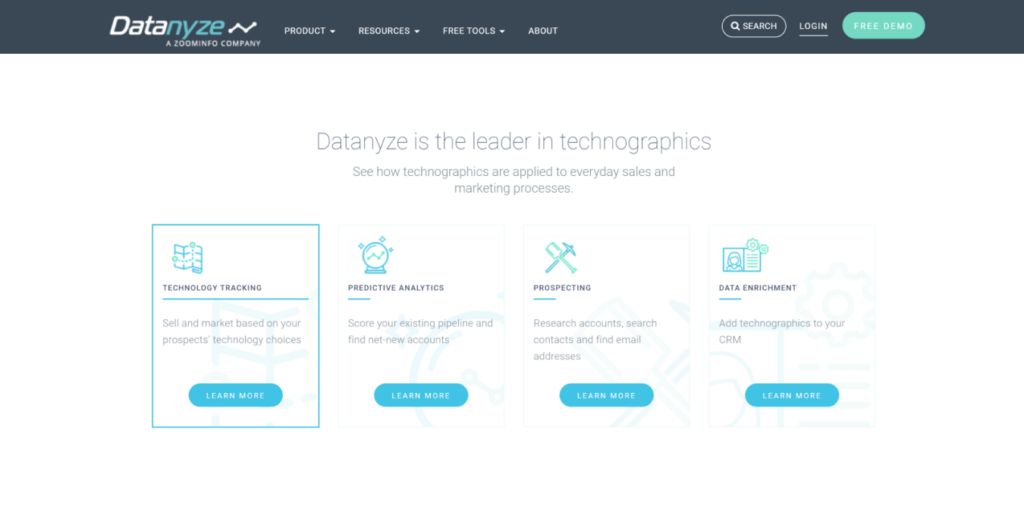
Datanyze positions itself as a go-to resource for sales and marketing professionals, proclaiming its status as a frontrunner in the realm of technographics—a term you might not be familiar with but needn’t worry about. Essentially, it offers insights into potential clients’ technological infrastructure.
Datanyze helps with:
- Analyze your best customers to find more perfect-fit prospects.
- Search with powerful filters to pinpoint ideal leads.
- Enhance your existing contact data for better outreach.
The platform supports searches with various filters and allows for the enrichment of your current contact database.
While pricing details are not directly available, interested parties are encouraged to inquire directly on their website for more information.
Gong
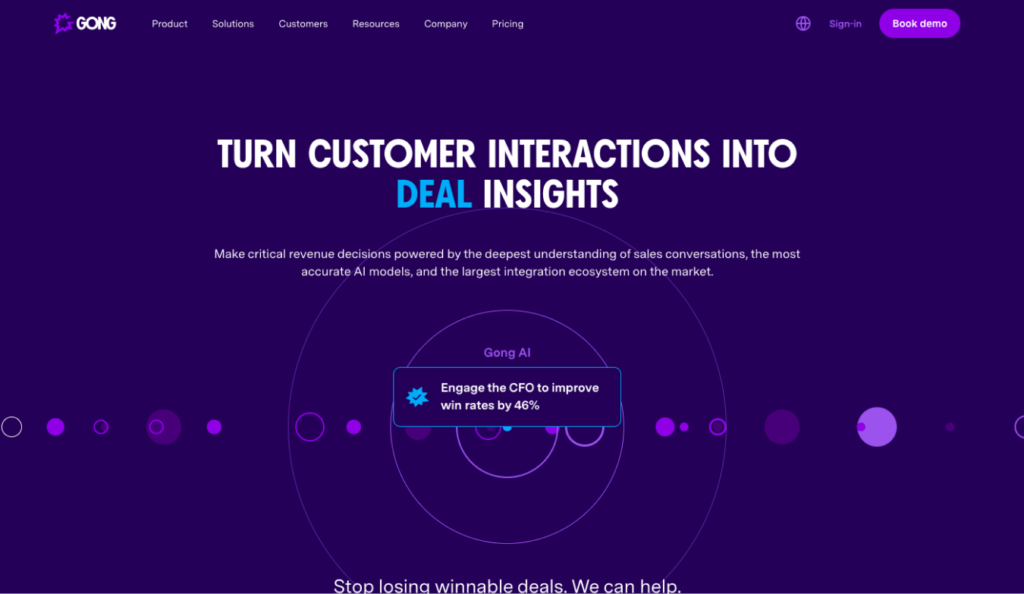
ong analyzes your sales calls and meetings, extracting actionable insights to transform your prospecting. Improve your lead engagement, close more deals, and boost your bottom line.
Key Benefits:
Data-Driven Prospecting: Turn sales conversations into insights, refining your approach for more tremendous success.
Adaptable Strategies: Pinpoint what’s working and what’s not, allowing quick strategy adjustments.
Targeted Messaging: Tailor your pitch to each prospect using proven language and techniques.
Pricing details are available upon request.
Bombora
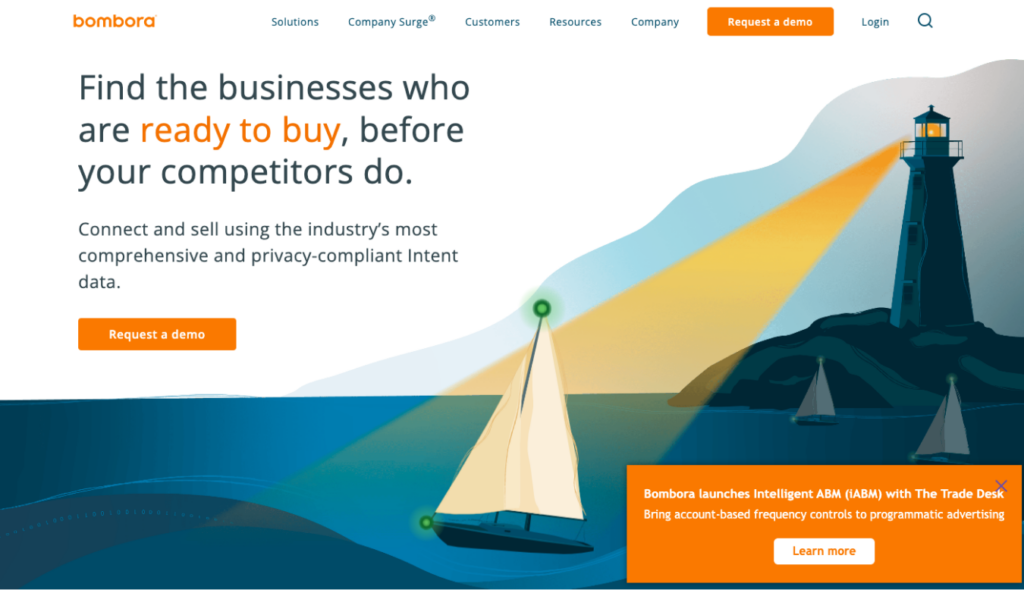
Bombora’s data based on intent signals gives you an inside track of potential leads. By tracking their online behavior, Bombora reveals who’s actively researching topics related to your solutions before they reach out.
This empowers you to:
Target the Right Leads: Focus your efforts on prospects already interested in your industry.
Tailor Your Outreach: Craft messaging that resonates with their needs and pain points.
Boost Conversion Rates: Increase the success of your outreach with timely, personalized communication.
Pricing – Upon request.
Clearbit
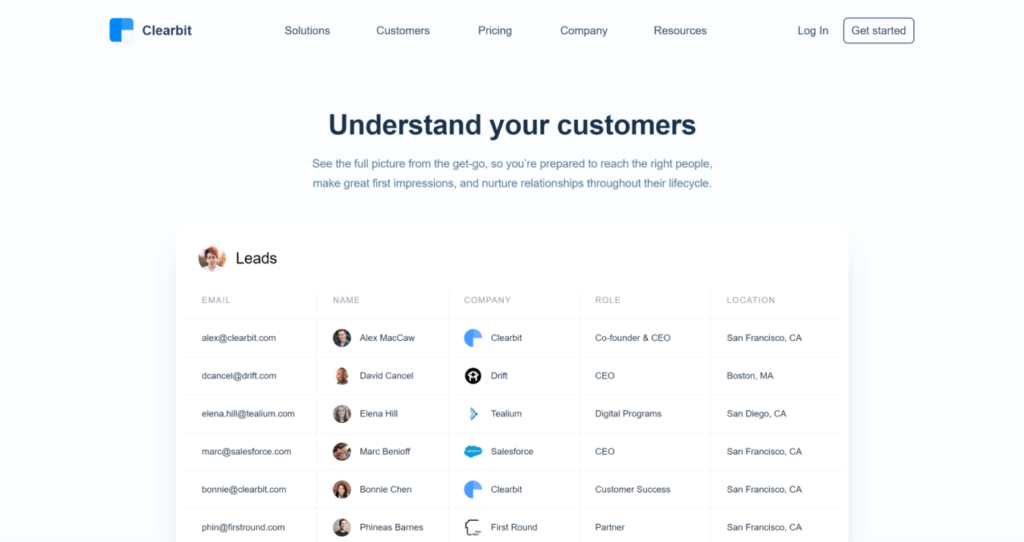
Clearbit presents four primary offerings: Enrichment (to enhance existing individual contact details), Prospecting (for discovering new contacts), Reveal (to convert website traffic into actionable contact data), and Forms (which auto-populates forms using visitor email address and contact information).
Both Prospecting and Enrichment are invaluable tools for sales managers. Enrichment enables the augmentation of current contact information, potentially within your CRM, by adding key details such as company size, employee count, or financial backing. If lead generation poses a challenge, Prospecting offers a solution by helping you create lists of targeted prospects, allowing you to concentrate on sealing deals.
Pricing for Enrichment begins at $99 per month for enriching up to 1,000 contacts. When integrated with Salesforce, Prospecting is available starting at $12,000 per year.
Crunchbase
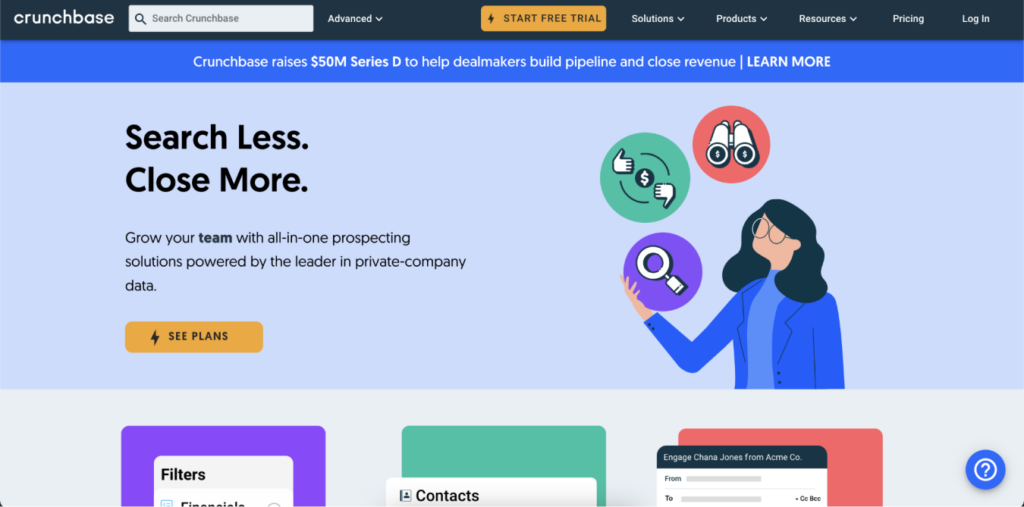
Crunchbase empowers sales and marketing teams to target the right companies with buying potential. Discover decision-makers, get in-depth company insights, and streamline your outreach for maximum success.
Key Features:
- High-Quality Data: Access accurate, up-to-date information on companies and key contacts.
- Automated Prospecting: Save time and find the best leads quickly.
- Personalized Insights: Tailor your approach based on company data and real-time alerts.
- Seamless Integration: Sync with your favorite sales tools for a streamlined workflow.
You can try Crunchbase for free or get advanced features starting at $29/user per month.
ZoomInfo
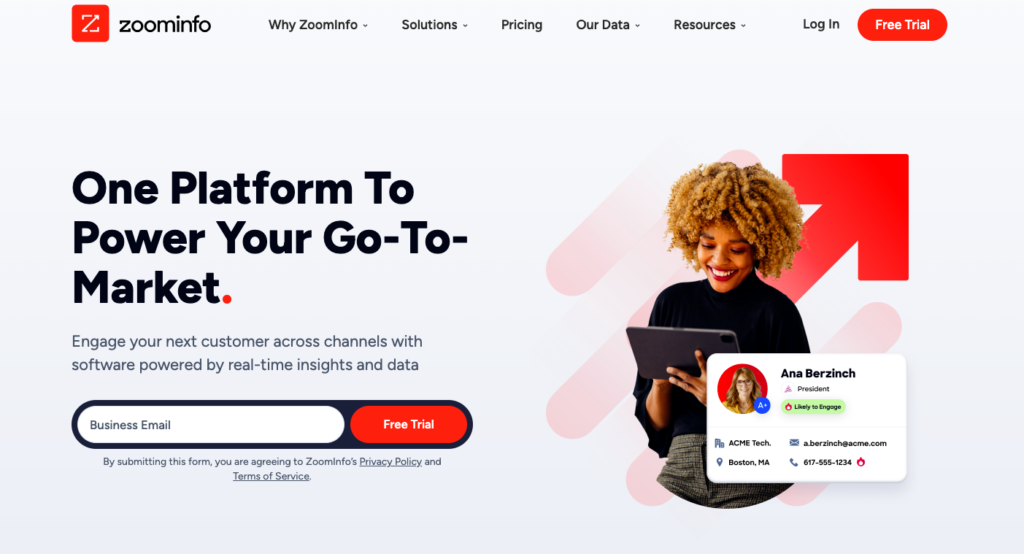
ZoomInfo unlocks access to a massive database of 150+ million business contacts, giving you the inside track for research and lead generation.
Key Benefits:
Accurate, Up-to-Date Data: Fuel your outreach confidently, knowing your information is reliable.
AI-Powered Prospecting: Automate tasks and uncover new opportunities with intelligent tools.
Real-Time Alerts: Stay ahead of the game with timely notifications on prospect activity.
Seamless Integration: Enhance your workflow by connecting with your favorite CRM and marketing platforms.
Leadfeeder
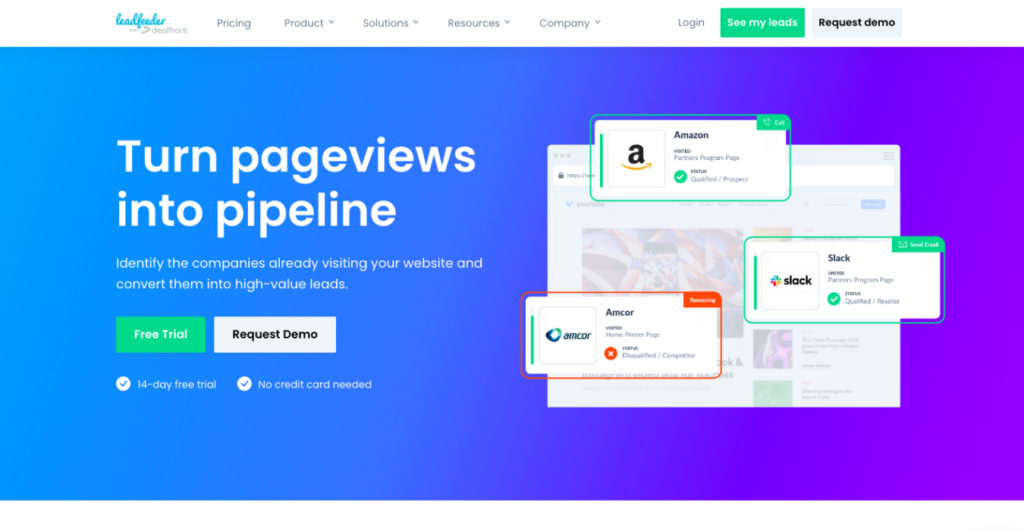
Leadfeeder distinguishes itself as an essential sales prospecting tool by identifying website visitors and associating them with their respective companies. It equips businesses with insights into warm leads, enabling timely and focused outreach efforts that enhance lead generation in the B2B SaaS sector.
Pricing options include a 14-day free trial, a complimentary Lite version, and paid monthly plans commencing at $199.
Choosing the best Sales Intelligence Tool
Selecting the right sales intelligence software can be challenging, but to help you avoid any possible missteps, here are a few critical steps to keep in mind:
Assessing Your Needs
The initial step in choosing the right sales intelligence software is carefully assessing your needs. It’s vital to understand both your requirements and your budget before making any commitments. Begin by outlining your sales process, including each stage, from lead generation to the final sale.
A clear comprehension of your sales process will help you identify the critical data points to monitor, such as company size, industry, job titles, etc. Once these data points are determined, you should define your objectives. What specific achievements are you aiming for using sales intelligence software?
Exploring Your Options
After pinpointing your needs and goals, the next phase involves exploring the available sales intelligence software options. The market offers a broad selection; finding the most suitable one demands thoughtful analysis.
Initiate your research by seeking out reviews on various sales intelligence solutions. Feedback from other users can shed light on the software’s functionality, user-friendliness, and support quality. These reviews are often found on review websites, social media, and directories dedicated to business software.
Examining Integration Capabilities
Choosing sales intelligence software also entails considering its integration capabilities. A tool might be exceptional on its own but may not fit well with your existing suite of tools if integration is problematic. This consideration is crucial and sometimes overlooked during the selection process.
Reviewing Security Measures
The security of your data is paramount when selecting any software for your business. Although assessing security features can be challenging due to their technical nature, they remain critical. Look for software that employs modern encryption methods like SSL, TLS, or AES, including SSL monitoring, to guarantee proper function.
It’s also essential to evaluate the software’s access control measures. Practical sales intelligence tools should offer features such as multi-factor authentication or passwordless entry, role-based access control, and IP address restrictions to ensure that only authorized individuals can access sensitive information.
Put Your Sales Intelligence Software to the Test
You’ve narrowed down your options – now it’s time to see how these tools handle your real-world needs. Follow these steps:
Get Hands-On: Request demos and trials from your top software choices. Explore the features and see how they function.
Test with Your Data: Don’t just rely on sample data. Import your contact lists and scenarios to see how the software performs with your specific information.
Assess Usability: Is the interface intuitive? Will your team be able to find what they need and use the tool effectively quickly?
Key Takeaway: This testing phase is crucial for ensuring the software is a good fit for your team and processes and provides the results you expect.
Think Big: Choosing Scalable Sales Intelligence Software
The perfect sales intelligence tool fits your needs today, but can it handle tomorrow’s growth? Here’s how to ensure scalability:
- Future-Proof Your Choice: Consider your long-term goals. How will your sales professionals and processes evolve? Choose software that adapts to your growing ambition.
- Pricing for Growth: Stay locked in. Analyze pricing structures – will upgrades be affordable as your team expands?
- Customization Matters: Flexibility is critical. Look for software that allows you to tailor features and workflows to your unique business needs.
The Takeaway: Investing in scalable sales intelligence ensures your software remains valuable as your business thrives.
Evaluating Sales Intelligence Reporting
Solid reporting unveils the true impact of your sales intelligence software. Here’s how to ensure it meets your needs:
Chart Your Course: Before diving in, define your reporting goals. What information is vital for your sales team? What metrics need tracking (e.g., conversion rates, lead sources)? Knowing your priorities helps you assess software capabilities.
Explore Reporting Options: Does the software offer pre-built reports relevant to your needs? Can you create custom reports tailored to your specific metrics? Looking for flexible software is especially important if your reporting structure deviates from the norm.
Customization is King: Can you personalize reports to match your unique needs? This flexibility is essential if your reporting structure deviates from the norm.
By following these steps, you can confidently evaluate the reporting functionality of different sales intelligence solutions and choose the one that empowers your team with the insights they need for success.
Advance Your Sales Intelligence Capabilities with Adapt.io
Sales intelligence doesn’t aim to replace your existing tools or team members – it supercharges them! Providing precise, timely data empowers you to target the perfect leads at the ideal moment, maximizing your conversion rates.
In today’s market, sales intelligence isn’t just an option; it’s a necessity. Choose a platform with specific features to unlock this competitive edge.
Discover Adapt.io: This robust platform delivers accurate, in-depth data to pinpoint the highest potential leads. See how it can transform your conversions.
FAQs
What Are the Functions of Sales Intelligence Tools?
Sales intelligence tools gather and synthesize information from diverse channels like social media profiles, company websites, news outlets, and public documents. They offer critical insights into potential and existing clients, empowering sales personnel to make knowledgeable decisions and enhance their productivity.
What Sets Sales Intelligence Tools Apart from Your CRM?
Sales intelligence tools and Customer Relationship Management (CRM) systems form essential elements of a complete sales tech stack. Yet, they cater to unique functions and target various stages of the sales journey. Here is an overview of the fundamental distinctions between sales intelligence tools and CRM:
|
Aspect |
Sales Intelligence |
CRM Systems |
|
Focus and Purpose |
Focuses on analyzing external data for market insights. |
Manages internal data to foster customer relationships. |
|
Data Sources |
Utilizes external sources like social media, news, and third-party data. |
Relies on internal interactions and sales activities. |
|
Information Type |
Provides external insights and identifies market trends. |
Deals with internal customer data and transaction history. |
|
Functionality |
Specializes in data analysis, lead scoring, and prospecting. |
Aids in customer management and tracking the sales pipeline. |
|
Timing in the Sales Cycle |
Used primarily in the early stages, such as prospecting and lead generation. |
Operates throughout the entire sales cycle. |
|
Automation |
Automates data collection, analysis, and gaining insights. |
Streamlines internal processes like data entry and task management. |
In practical terms, businesses frequently combine sales intelligence tools with CRM systems, crafting an integrated approach that merges external market insights with internal customer data. This synergy provides a well-rounded perspective on customer interactions and market trends, facilitating a more knowledgeable and strategic framework for sales and customer relationship management.
Why Opt for Sales Intelligence Software?
Sales intelligence tools give your team a competitive edge. Here’s how they transform your sales process:
- Smarter Decisions: Access real-time market insights and lead data to replace guesswork with informed strategies.
- Laser-Focused Targeting: Identify your ideal customers and prioritize the highest-potential leads with pinpoint accuracy.
- Personalized Outreach: Understand each prospect’s needs and pain points to tailor your messaging and boost engagement.
- Accurate Forecasts: Analyze past trends and predict future outcomes, empowering proactive planning and adjustments.
- Streamlined Workflow: Automate leads scoring, nurturing, and tracking to manage the sales funnel efficiently.
- Boosted Productivity: Free your team from time-consuming tasks, allowing them to focus on building relationships and closing more deals.
Sales intelligence isn’t just a trend; it’s the key to unlocking sales success in today’s data-driven market.
How do Sales Intelligence Tools Aid in Generating Qualified Leads?
Explore how leveraging sales intelligence tools can help you efficiently produce qualified leads on a large scale.
Creating a Data-Driven Ideal Customer Profile (ICP) – Sales intelligence tools significantly refine your ICP’s accuracy by providing deep insights into customer demographics. They equip you with crucial information like behavioral intentions, content preferences, buying signals, geographical presence, organizational size, and more.
Detecting Sales Opportunities—Sales intelligence allows you to pinpoint accounts actively seeking your products or services. Adding multiple sales triggers enables you to approach potential customers opportunely, enhancing your sales results.
Customizing Your Outreach—Insights gleaned from sales intelligence tools transform your outreach from broad to highly personalized strategies. Customizing your communication for each lead greatly improves your chances of engaging your audience. For instance, a moving company can use sales intelligence to identify families relocating in their area and tailor their marketing messages to address the unique needs of those customers.
Quickly Identifying Top Leads—Sales intelligence tools facilitate objective lead evaluation through a data-driven methodology, enabling quicker prioritization of promising leads.
Enhancing Efficiency with Workflow Automation – Sales intelligence solutions often incorporate automation for tasks like lead scoring and data management. This efficiency boost allows sales teams to dedicate more energy to sealing deals.
The Perfect Fit: Finding Your Sales Intelligence Partner
In B2B company sales, the right sales intelligence tool isn’t just about features – it’s about finding the perfect match for your unique goals and workflow. Consider it an extension of your team, empowering you with the data you need to make informed decisions and propel your business forward.
Now, take the first step! Explore the options, prioritize what matters most to your success, and find the tool that clicks. Happy prospecting!


